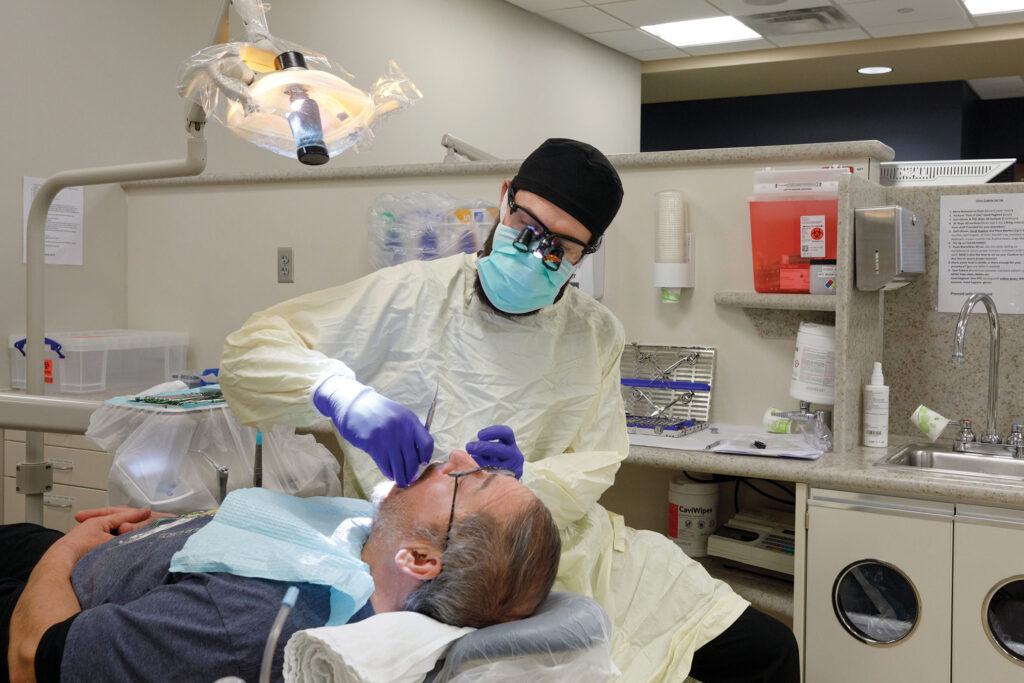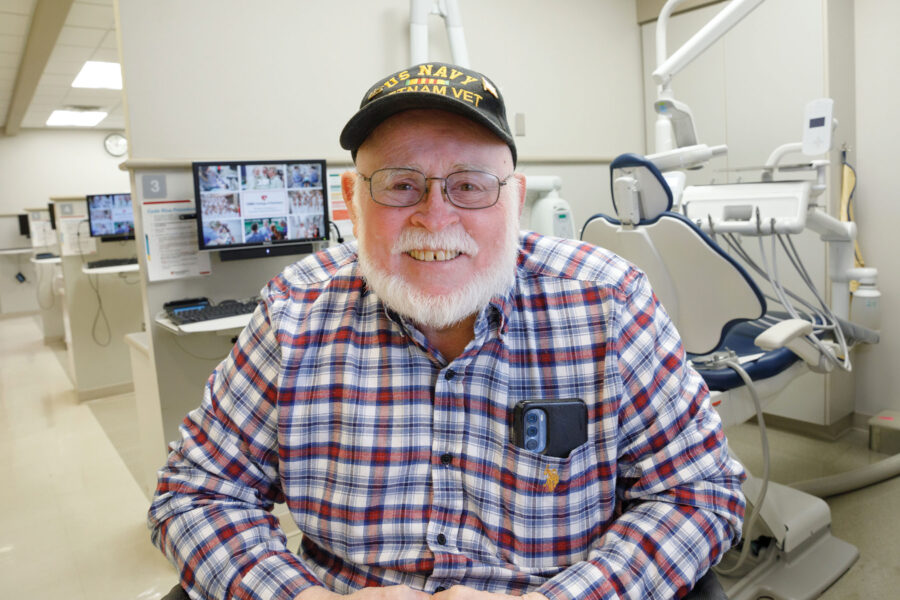Ronald Catt has been coming to the UNMC College of Dentistry’s student clinic for decades.
“Close to 40 years,” the 78-year-old said.
In that time, he’s gotten cleanings, fillings and other routine dental work done.
But in 2024, he was faced with the need for a procedure — a partial denture that would require extractions and other work — that, even with the student clinic’s reduced fees, was a financial impossibility for the Navy veteran who served in Vietnam.
“They told me it would be $3,600 to repair,” he said. “I said, ‘Nope, can’t do it.’”
About a week later, the clinic called back. Catt could now have the procedure — at no cost — as part of the UNMC College of Dentistry’s new VETSmile Dental Clinic.
In collaboration with Veterans Affairs’ VETSmile program, the UNMC College of Dentistry offers affordable or complimentary dental services to veterans who are enrolled in the VA health care system but are not eligible for dental benefits.

Open since July 2024, the donor-funded UNMC VETSmile Dental Clinic already has served more than 100 veterans. Patients receive care from UNMC dental students and faculty volunteers and establish a dental home for ongoing care and preventive services.
Only 15% of veterans enrolled in health care through the U.S. Department of Veterans Affairs are eligible for dental benefits. The statistic hits home for UNMC College of Dentistry Dean Gerard “Gerry” Kugel, DMD, whose father died of injuries related to his military service when Dr. Kugel was only 3.
“Dental schools provided my dental care throughout my childhood — and I had VA benefits,” he said. “I went to dental schools because I didn’t get dental benefits. People in Nebraska may not realize veterans don’t get dental care — only if they’re fully disabled.”
When Dr. Kugel came to Nebraska in 2023 from Tufts University School of Dental Medicine in Boston, he found himself in what he describes as a “veteran heavy” state where he saw a big need.
“There are approximately 115,000 veterans in Nebraska not getting dental care, not being eligible,” Dr. Kugel said. “Of those vets, according to the Veterans Administration, about 60% say it’s due to the cost.”
He pointed to a VA survey that said dental care is the biggest health concern for Nebraska vets, ahead of both mental health care and medical care.
“The other staggering statistic? Close to 45% of vets in Nebraska experience dental pain in any given year. If they can’t get to a dentist or afford a dentist, we want to be their home.”
Click Play below to watch this Campus Spotlight video on the VETSmile Clinic at the UNMC College of Dentistry, featuring UNMC Interim Chancellor H. Dele Davies, MD, and Dean Gerry Kugel, DMD, PhD.
Greg Bennett, DMD, chair of the UNMC Department of Adult Restorative Dentistry, said college faculty and students were aware of the need within the state, in part because of the annual Veterans Mission of Mercy Dental Clinic, an intensive, two-day event to provide dental services to as many veterans as possible.
“Many of us volunteer for Mission of Mercy every year,” said Dr. Bennett, himself a veteran of the Navy. “But what do we do with patients in the meantime? A lot of them will have multiple teeth extracted, and they’ll get a denture. But those need adjusting, they need aftercare, and there’s nowhere to go.”
The answer, Drs. Kugel and Bennett decided, was a true, accessible dental home for the state’s underserved veterans. Patients now get referred from the Lincoln VA Medical Center, and all their dental needs are covered. Currently, the VETSmile Clinics are held every Friday afternoon.
Initial efforts are being funded by an anonymous donor, and other funding sources are being explored. Currently, the VA is referring Lincoln-area veterans only to the clinic.
“They told us if they opened it statewide, we would be flooded, and they were right,” Dr. Bennett said. “We already have a two-year list of patients. But we do need to expand.”
Phone calls have come in from other areas of Nebraska that Dr. Bennett called “heartbreaking,” seeking help that the clinic currently does not have the funds or capacity to provide.
They have tried other events. On Veterans Day in 2024, the college’s clinic was open for all Nebraska veterans at no cost, again covered by donor funds.
But the need remains.
“Outside of New York University, we’re doing more than any school,” Dr. Kugel said. “For dental schools, this is becoming a popular topic, but we’re way ahead of the game.”
Credit Dr. Kugel, who has been working with veterans since his time in Boston, teaming with a dental hygienist to hold low- or no-cost dental screening events in Boston homeless shelters and a low-income housing complex for veterans in Brighton, Massachusetts. His efforts caught the attention of one of his patients — Ashton Carter, the United States’ 25th secretary of defense.
The result was a program called Service with a Smile, where dentists treated veterans in private practice. Once a month, Dr. Kugel’s office provided free comprehensive dental care to homeless veterans.
Drs. Kugel and Bennett lauded their student and faculty volunteers, many of whom — like Dr. Bennett — are former military.
“We’ve got some of the best students I’ve ever worked with,” Dr. Kugel said. “I’m going to venture they are some of the best in the country — you could walk into their dental chair today and get the equivalent of what you’d get from a dentist who’s been practicing for years.
“They’re an incredibly dedicated group of students, and they participate in the clinic because they want to be the best. They want experience. The other day, a group of students were recontouring a bony ridge (on the jaw), two of the best students I’ve ever dealt with in my life. The patient had extractions, and the bone was rough, and they’re recontouring bone.
“One student put in a bone graft. Another prepped four teeth, then scanned and milled four crowns. All for veterans. We don’t force our students to do this. They just show up.”
Dr. Bennett agreed.
“Donors are voluntarily funding it, students are voluntarily working on patients, faculty are voluntarily showing up for this clinic. It’s a nice experience. Quite a few students end up teary-eyed just hearing the stories of patients and seeing the patients’ level of appreciation. It’s showing them the impact they can have on someone’s life — a lot of times, they’re giving people their life back.”
Fourth-year dental student Nick Stolze is one of those volunteers. He joined the team, he said, when he realized the shortage of dental care for veterans in Nebraska made the VETSmile Clinic the only option for some of them.
“It’s a great way to give back for everything they’ve given to our country,” he said.
Working with the veterans, Stolze said, he realized there’s more to dentistry than fixing a tooth or restoring a smile.
“This opportunity is giving them a new outlook on life, which some have wanted and deserved for so long,” he said. “The opportunity to restore that for them has been very rewarding.”
With the student volunteers getting a range of clinical experience, and the veterans getting free care, Stolze called the clinic a win-win for both groups.
“This has been a huge blessing,” he said, noting the pride he has in seeing dental and dental hygiene students volunteering their time and skill to take part in the effort. “I know it’s an experience a lot of my classmates will carry forward.”
Catt visited the VETSmile Clinic on his 51st wedding anniversary and said the program has changed his life.
“For Catt, we ended up doing multiple fillings, several crowns, and then partial dentures,” Dr. Bennett said.
An unexpected reaction? Catt originally had a gap between his front teeth — what dentists call a diastema. And, he told his care team, his wife didn’t like his smile without it.
“He kept saying he always had that space,” Dr. Bennett said. “So, yes, it’s a beautiful, perfect smile — but it’s not him.”
So, they sent a new partial to the lab, with a space added. And when it came back, Dr. Bennett said, Catt couldn’t have been happier.
“That’s an important part of it,” Dr. Bennett said. “Let’s
do what’s right. And you see how much you can change someone’s life.”
Catt, who has been receiving services at the dental school for nearly four decades, said he has never had a bad experience working with a dental student or student hygienist.
“These kids take their time,” he said. “They call afterward to see how I’m doing. That kind of sincerity has got nothing to do with money; they care about the patient.
“These kids — and I can’t tell you how many students I’ve
had treat me — when they have a job to do, they strive with pride. Between the students and instructors, they don’t fall short on anything.
“They are all very professional and caring — they worry about the patient hurting — because pain is my biggest fear, as with everyone else.
“I can’t say enough about the college, this program and the students,” he said.
The challenge for the clinic, Dr. Kugel said, is sustainability. VETSmile is a national liaison between dental schools, such as UNMC and NYU, and local medical centers. But it is a pilot program, only authorized by Congress through 2026.
“It is intended to demonstrate that there is a mechanism for doing this successfully to then try to get federal funding,” Dr. Bennett said.
And since the goal is to tackle bigger problems than simple cleanings or cavities, work sometimes takes several appointments, effecting how many people the clinic can take on as patients and creating a growing waitlist.
Still, Dr. Kugel is eyeing not only funding the clinic past 2026 but expanding it to Omaha, and the college is exploring support possibilities.
For Dr. Kugel, Dr. Bennett and their faculty and students, this is not only a labor of love. It is fulfilling UNMC’s mission to improve the lives of the people of Nebraska.
“We have a lot of dental need in Nebraska, and we are short on dentists,” Dr. Kugel said. “It’s not like the vet can go a block or a mile away and find a dentist. If you’re in the western part of the state, it’s hard to find a dentist if you’ve got money. It’s almost impossible if you don’t have money.
“As a state, this is the problem we are facing. And as the state’s dental college, we are committed to being part of the solution.”
Erin Wirth and the UNMC College of Dentistry contributed to this story.
